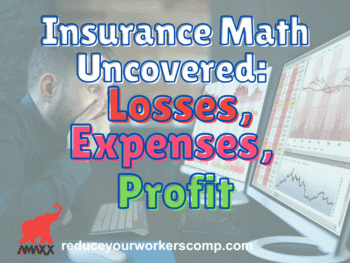An employer’s Experience Modification Factor (“mod”) is an important number in a premium calculation and tells a story in and of itself. This is truly a modification factor because an employer’s rate or premium is modified or adjusted up or down based upon the factor.
NCCI, the National Council on Compensation Insurance (a rating bureau) calculates mods annually for non-self insured employers, usually based on a three-year history of loss experience. Some states have rating bureaus independent of NCCI. Typically the most recent complete year is not included but the three policy years prior to that count. For example, for policies expiring on January 1, 2010, the three years included would be January 1, 2006–January 1, 2009. Older years experience drop off as time progresses every year. So, a company is essentially only penalized for three years for an exceptionally bad year from a loss standpoint.
The calculation of a mod is based on a standardized formula applying payroll, payroll classifications (class codes associated with the type of job or risk), claim frequency (number of claims) and claim severity (cost of claims). Claim frequency is weighted slightly higher than severity and medical-only claims are discounted so they don’t carry nearly the weight of a claim involving an indemnity payment (usually lost-time or settlement).
An average is also calculated for all employers in the same state in the same business based upon information submitted by insurance companies to the rating bureau. A premium credit discounting the manual premium is given to reward employers with better than average performance in terms of loss experience and premium debits are applied to the annual premium for employers with worse than average performance or experience resulting in, of course, a higher premium.
For example, a company with an experience mod of 1.10 is performing at a level 10% worse than the average of other similar companies in the same state. A company with a mod of .90 is performing at a level 10% better than the average of peer companies. (workersxzcompxzkit)
An employer’s mod can be controlled by implementing solid safety programs to prevent losses and once losses occur, effective claims management and early return-to-work strategies to reduce claim costs. Every employee should be engaged in workplace safety. All of these things matter at the end of the day because they all have an impact on your premium and ultimately, your bottom line.
Author Robert Elliott, executive vice president, Amaxx Risks Solutions, Inc. has worked successfully for 20 years with many industries to reduce Workers' Compensation costs, including airlines, health care, manufacturing, printing/publishing, pharmaceuticals, retail, hospitality and manufacturing. He can be contacted at: Robert_Elliott@ReduceYourWorkersComp.com or 860-553-6604.
Podcast/Webcast: How To Prevent Fraudulent Workers' Compensation Claims Click Here http://www.workerscompkit.com/gallagher/podcast/
Fraudulent_Workers_Compensation_Claims/index.php
FREE WC IQ Test: http://www.workerscompkit.com/intro/
WC Books: http://www.reduceyourworkerscomp.com/workers-comp-books-manuals.php
TD Calculator: www.reduceyourworkerscomp.com/transitional-duty-cost-calculator.php
WC Books: http://www.reduceyourworkerscomp.com/workers-comp-books-manuals.php
TD Calculator: www.reduceyourworkerscomp.com/transitional-duty-cost-calculator.php
Do not use this information without independent verification. All state laws vary. You should consult with your insurance broker or agent about workers' comp issues.
©2009 Amaxx Risk Solutions, Inc. All rights reserved under International Copyright Law. If you would like permission to reprint this material, contact Info@WorkersCompKit.com



























